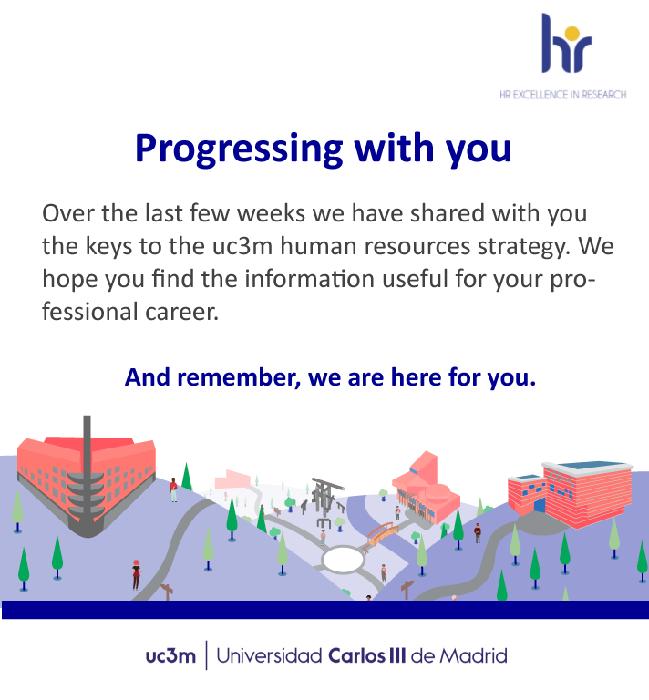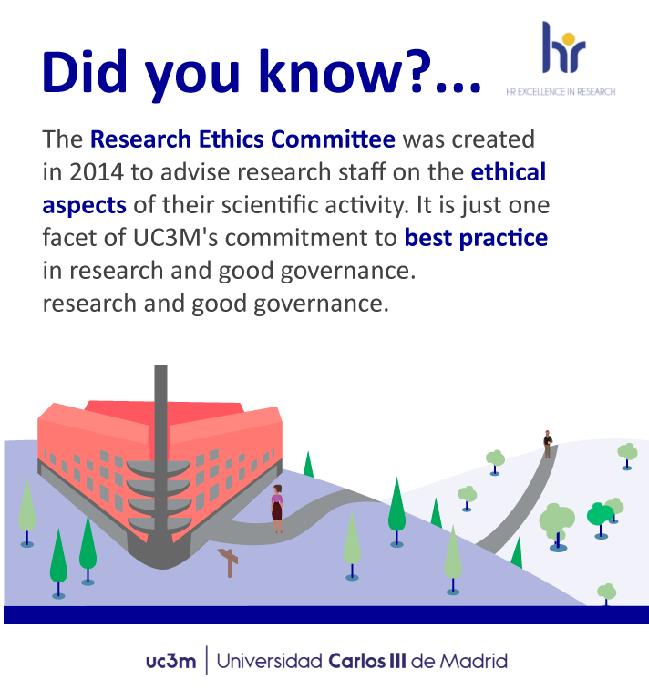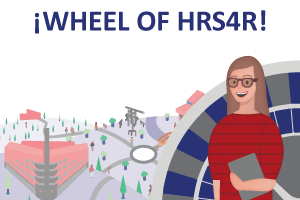HRS4R communication strategy
- HR Excellence in research
- HRS4R communication strategy


The Human Resources Strategy for Faculty (HRS4R)

MOVE FORWARD WITH YOU
 During these weeks we have been disseminating the human resources strategy for the UC3M Faculty through different articles, posts and games. Our objective was twofold: to raise awareness of this strategy and to thank all the faculty for their efforts and commitment despite the difficulties, especially in recent years.
During these weeks we have been disseminating the human resources strategy for the UC3M Faculty through different articles, posts and games. Our objective was twofold: to raise awareness of this strategy and to thank all the faculty for their efforts and commitment despite the difficulties, especially in recent years.
The Human Resources strategy for the Faculty of our university aims to facilitate our careers and smooth our paths as much as possible, our colleagues have shared experiences and desires that are framed in this strategy.
In any case, remember that UC3M Services will always be available to guide us and help us in any way they can.
.
ETHICAL COMMITMENT

The Research Ethics Committee was created in 2014 in response to the growing need to evaluate the implications of R&D&I projects developed at UC3M. The UC3M Ethics Committee's main competencies include issuing reports, recommendations and suggestions regarding certain aspects related to research, specifically when it affects human beings, human embryos and animals; the use of personal data; the fundamental rights of individuals; research in cooperation with developing countries; or applications in defence and security or military use.
It is just one facet of our commitment to best practice and principles of good governance, as reflected in our own values and national and international codes of ethics.
Thus, the university fulfils and encourages its faculty to comply with the following objectives:
- To ensure compliance with the codes of good practice in research and teaching.
- Encourage innovation, seeking to improve teaching-learning processes.
- To promote excellent, international and interdisciplinary research.
- To dynamise the integration between research and transfer models, giving priority to the transfer of R&D&I results.
- Increase the visibility and impact of knowledge, promote open access and actively participate in the development of Citizen Science.
- Respect and promote equality, diversity and inclusion policies.
- Contribute to the promotion of the 2030 Agenda and its SDGs, taking specific actions for the benefit of the ecological transition.
WORKING CONDITIONS AT UC3M
UC3M works to provide an attractive, open and viable working environment for its Faculty. Among its objectives is the continuous improvement of the physical and virtual environments to guarantee excellent teaching and research activity. It is necessary to take care of people and facilitate the development of their professional careers, including the promotion of mobility.
The human resources department is the most important player in achieving these strategic objectives, and its functions include:
- Faculty career planning.
- Encouraging the mobility of faculty to organisations of recognised prestige.
- Stabilising the employment of the Faculty within the rules that the administrations allow us to do so.
- Maintain a healthy working environment.
- Develop the digital transformation.
CLEAR AND TRANSPARENT RECRUITMENT AND TALENT ATTRACTION POLICY
The Carlos III University of Madrid is working to adapt its Human Resources policies to best practices. The aim is to incorporate high quality faculty and foster their professional development. To achieve this, we apply the European Charter for Researchers and the Code of Conduct for the Recruitment of Researchers and, in particular, the OTM-R UC3M principles. These principles require a clear and transparent recruitment and talent attraction policy, and thus UC3M seeks to:
- To give greater publicity to the selection processes and the evaluation criteria for the different types of contracting.
- Improve the description of working conditions, including prospects for professional development and recognition.
- Select selection committees specialised in the areas and competencies and balanced in gender.
When deciding on recruitment, it is also necessary to assess merits in a comprehensive manner, specifically recognising experience in academic and professional mobility, and academic activity of excellence. The latter will also be taken into account in promotion processes. In this way, scientific and technological progress will be favoured, and as a consequence, the quality of life and welfare of society.
HR STRATEGY FOR TEACHER AND RESEARCHERS
The Human Resources strategy for the Faculty of Universidad Carlos III de Madrid is aimed at fulfilling the mission of the university, that is, to contribute to the improvement of society with quality teaching focused on the student and advanced research in accordance with demanding international criteria.
It also aims to increase the visibility and impact of knowledge, making it accessible and open, while boosting the transfer of results to society.
In defining our HR strategy, we have taken into account two main sources.
On the one hand, the values and principles with which the institution identifies itself, defined through a series of instruments such as, among others, the Strategic Plan, the Equality Plan and the Code of Good Conduct. On the other hand, the main national and international codes of ethics, and in particular the European Charter for Researchers and the Code of Conduct for the Recruitment of Researchers.
We have distilled these principles into five main pillars: ethical principles of governance, open and transparent recruitment, training and development, viable working environment and career and, finally, communication and participation.
All of this always putting the people who make up our Faculty at the centre.



